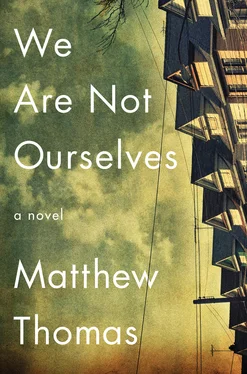Ed was more open-minded about other cultures. When they walked through Greenwich Village, he marveled appreciatively at the stratospheric Mohawk haircuts of the punk rockers, while she felt only disgust. So when they found themselves at Father Choudhary’s first Mass, she wasn’t surprised that Ed seemed extra attentive. To her, Father Choudhary looked spooky under his stark-white vestments, with the effigy of Jesus behind him on the altar. He spoke in a trilling accent. Even the Hispanics looked around as if to say, This guy isn’t one of us . Ed just sat with his arms folded in amusement, or tapping the church bulletin against his thigh.
During the reading, Ed was usually good for a flip to another section of the liturgy — he was more into the literature of the Bible than the sacred text aspect — but with Father Choudhary at the pulpit, he held the book open to the reading. At least she could understand Father Choudhary better than Father Ortiz, who she wished would give in and speak Spanish with an interpreter beside him.
It was a reading from the book of Proverbs, on how the wisdom of God was born before the earth was made:
When he established the heavens I was there,
when he marked out the vault over the face of the deep;
When he made firm the skies above,
when he fixed fast the foundations of the earth;
When he set for the sea its limit;
so that the waters should not transgress his command;
Then I was beside him as his craftsman,
and I was his delight day by day,
Playing before him all the while,
playing on the surface of his earth;
and I found delight in the sons of men.
When Father Choudhary closed the book to begin his homily, Ed settled in to listen. Father Choudhary began preaching about matters wholly unrelated to the reading: the idea that if we are all made of dust, then the same dust, cosmic dust, he called it, could be found throughout the universe; that this cosmic dust might have been created by the Big Bang; that somehow our sharing in this dust called us to responsibility to each other. Ed looked positively enthralled. Father Choudhary spoke of the smallness of man in relation to the vastness of the universe, and how that smallness was instructive, how it reminded us that part of our humanity was a sense of humility. He exhorted everyone gathered to allow themselves to feel wonder and awe in the face of all creation, big and small. Then he quoted from a French Jesuit named Teilhard de Chardin: “He recognized with absolute certainty the empty fragility of even the noblest theorizings as compared with the definitive plenitude of the smallest fact grasped in its total, concrete reality.” She had never seen Ed more enthused at church. He slapped his hand on the back of the pew in front of him, and for a moment, as she watched him shift in his seat in restless indecision, she thought she would have to reach over and keep him from standing and applauding.
After Mass, a crowd gathered outside the church. Eileen worked her way to the curb, but when she turned, only Connell was behind her. Ed was on the steps, waiting in the receiving line to greet the priest like a well-wisher at a wedding. This was too much.
She reached him just as he was extending his hand for a shake.
“Great speech,” he said absurdly, as though congratulating a politician. “Where are you from?” She was mortified, but Father Choudhary seemed delighted as he pumped Ed’s hand. They talked at length, the receiving line at a standstill.
She waited until they had gotten far enough away.
“What was all that about?”
“All what?”
Connell had produced a tennis ball from his pocket and was bouncing it to himself.
“Since when are you so interested in the lives of priests?”
“He did a good job,” Ed said.
Connell lost the ball and Ed fetched it from the street, flipping it in his hand as he walked, infuriating her. In her anger she twisted the bulletin into a baton that she smacked into her open palm like a nightstick.
“You really needed to ask where he’s from? He’s from India.”
“He’s from Bangladesh.”
“You needed to know that?”
“I like to learn new things. If we don’t learn, we die.” Ed threw the ball to Connell. “Isn’t that right, buddy?”
When they arrived home, Ed stood rooted to a spot on the sidewalk in front of the house. She waved Connell inside, and the boy hesitated, then went in. Ed didn’t budge. She began to climb the stairs, hoping Ed would follow.
Ed bounced Connell’s ball on the ground and caught it. “I saw the paper,” he said. “The houses you circled.”
She tucked up her skirt and sat on the top step. She felt as if she’d been caught canoodling with a boyfriend. The ball went thwunk as it hit the sidewalk; Ed cradled it back into his cupped palm.
“I don’t want to leave,” he said. “We have a perfectly nice house. We know the neighborhood. Doesn’t that count for anything? Plus, we have this new priest.”
“He’s Indian ,” she blurted out incredulously before she could catch herself. “Look around you. Look at what’s happening to this neighborhood. What’s already happened.”
“It’s home,” he said.
“How about that?” she asked, pointing to some graffiti at the base of the big apartment building across the street.
“That too,” he said.
“How about when you walked in covered in eggs on Halloween?”
“Kids horse around everywhere.”
“How about when Lena got mugged?”
“You can’t live in a bubble,” he said.
“How about what happened to Mrs. Cooney? You want that to happen to me?”
“Of course not. But that was an accident.”
“I’d say it was closer to murder.”
She paused, feeling herself shift from anger to resolution. She didn’t need to argue with him. She could do this without him if she had to.
“I want us to look,” she said. “Just to know what’s out there.”
He shook his head. A tiny patch of bald was forming, but she could only see it from this angle. He stopped bouncing the ball and put his hand on her foot and gave it a squeeze. The touch electrified her, as if he had channeled all his energy into his hands.
“I can’t explain why I can’t give you more in this,” he said. “I just really don’t want to go anywhere. Have you ever felt like life was getting away from you, and people were lapping you and you couldn’t catch up? And if you could just stop the world and take it all in, and nobody would go anywhere for a little while, you’d have enough time to understand it? I wish I could do that. I don’t want anybody or anything to move an inch.”
“People move,” she said. “That’s life.”
“I’m lodging my protest,” he said, and he put the ball in his pocket and rose to go inside, leaving her alone on the stoop.
The first house she saw cost nine hundred thousand, at least twice what they could afford. She had to see it, though, to have a basis for comparison.
She wore a nice gray suit, a ruffled blouse, and heels. She drove up a long driveway that turned into a circle in front of the house, along whose perimeter a few cars were parked: a BMW, a VW, an Audi. She was embarrassed to be driving a Chevy Corsica. She was glad that Ed’s torpor hadn’t led to an attenuation of his car-washing habit; at least she had neatness on her side.
The door was open. She entered a capacious vestibule with marble floors, oil paintings on the walls, and an enormous chandelier hanging from the vaulted ceiling. She took in the sweep of the place for only a few moments before an effervescent real estate agent descended the stairs, trailing behind her a young couple who were dressed more casually than Eileen and looked more comfortable there. She had made a mistake. She removed her jacket — it was too warm for one — as they took the final steps of what seemed an endless staircase.
Читать дальше
Конец ознакомительного отрывка
Купить книгу












